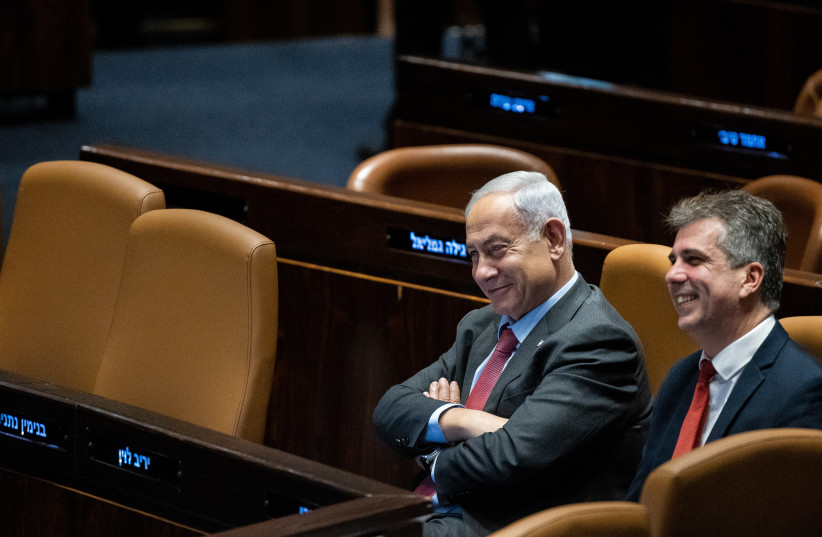Prime Minister Benjamin Netanyahu took over Israel’s back-channel diplomacy yesterday, after Foreign Minister Eli Cohen prematurely published information about a secret meeting with his Libyan counterpart, who was fired and fled the country amid a popular massive backlash.
News of the meeting set off a wave of violent protests in Libya and threatened to destroy behind-the-scenes endeavors to normalize ties between Jerusalem and Tripoli, which currently lack diplomatic relations.
On Tuesday, Netanyahu declared that all secret diplomatic meetings by any government ministry must be approved by his office in advance. His office stated that “the publication of any secret meeting will require the personal approval of... Netanyahu.”
It was a move that both seemed to discredit Cohen and allowed Netanyahu to distance himself from the foreign minister’s actions. It sent a message to those Israel might speak with in the future, that he would work to protect the secrecy of those exchanges, even though it’s presumed that he knew about the Libya meeting.
The publication of details of Cohen’s meeting with Libyan Foreign Minister Najla Mangoush threatened to harm Israeli moves to normalize with other countries, primarily Saudi Arabia. It also sent ripples of concern to Israel’s allies, such as the United States, which is involved in Israel’s normalization efforts, and Italy which facilitated the meeting with Libya.

Mangoush, who was fired for meeting Cohen, allegedly fled to Turkey on Monday and has reportedly continued on from there to London.
Cohen has been accused of “burning down the house” in search of a headline.
Is Israel destroying diplomatic relationships for a headline?
“It was a disaster,” former Israeli consul-general to New York Asaf Zamir told Israel Radio. He himself was fired by Cohen for statements he made against the government’s judicial reform plan, and he is now running in the Tel Aviv mayoral election.
He added: “what is happening today in the Foreign Ministry is very sad. Yesterday all of Israel saw how one can destroy diplomatic relations for a headline... but the Israeli people should know that this happens on a daily basis in places where most people are not paying attention.”
He specifically mentioned comments by Finance Minister Bezalel Smotrich and National Security Minister Itamar Ben-Gvir.
“Day-to-day these fiascos” are costing Israel on the global stage, he said.
Former foreign minister Avigdor Liberman (Yisrael Beytenu) told 103FM that this is what happens when one “turns the Foreign Ministry into a public relations ministry.”
Liberman charged that Cohen has been busy in the last year advancing himself rather than promoting foreign relations so that he can make his mark before he is replaced by Israel Katz, who is currently the minister of energy and infrastructure.
Cohen defended his record in the Foreign Ministry, explaining that his office “works regularly through overt and covert channels, and in a variety of covert ways, to strengthen Israel’s connections in the world” in a statement he published on X, formerly known as Twitter.
He listed Oman’s agreement to open its skies to Israeli planes, even though the two countries do not have diplomatic relations, and the free trade agreement with the United Arab Emirates.
Cohen said the Foreign Ministry had opened two new embassies in Muslim countries and had secured pledges from three countries to open embassies in Jerusalem. None of these things would have taken place, he said, were it not for “discreet preparatory actions” that involved “secret moves” through many channels, Cohen said.
“It is a shame that political opponents who did not promote any significant achievement, rush to react without knowing the details,” he continued. “The attacks will not deter the Foreign Ministry and its excellent employees from continuing to work tirelessly for the State of Israel and for creating and strengthening ties with our many friends in the world, and in the Arab world in particular.”
